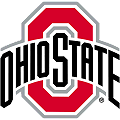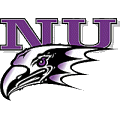 Ohio State
Ohio StateNickname: Buckeyes
Location: Columbus, OH
Founded: 1870
Conference: Big Ten
National Championships: 0
Last NCAA Appearance: 2009
Last Frozen Four: 1998
Coach: Steve Rohlik (4th season)
2015-16 Record: 14-18-4 (8-8-4 Big Ten, 4th place)
Series: Tied, 0-0-3
First Game: December 27, 1973 (Troy, NY)
Last RPI win: Never
Last OSU win: Never
2016-17 games: November 18-19, 2016 (Troy, NY)
Key players: D Drew Brevig, sr.; G Christian Frey, sr.; F David Gust, sr.; D Josh Healey, sr.; F Nick Schilkey, sr.; F Luke Stork, jr.; F Matthew Weis, jr.; F Miguel Fidler, so.; F Mason Jobst, so.; F Dakota Joshua, so.; D Sasha Larocque, so.; D Tommy Parran, so.; F John Wiitala, so.; F Tanner Laczynski, fr.; F Sam McCormick, fr.
That "reunion" was supposed to be of the Nanne brothers. Lou Nanne's younger brother, Tyler, committed to Ohio State in January 2014, just a couple of months after Lou committed to RPI. That summer, he was drafted by the New York Rangers in the fifth round of the NHL Entry Draft. But just before his freshman season was about to begin, the younger Nanne nearly lost his life to myocarditis, an inflammation of heart muscle. He sat out all of last season, and last month a report by KSTP-TV indicated that he would be transferring to Minnesota - understandable given the circumstances, allowing him to be closer to home. Tyler hopes to play for the Gophers this coming season, which would allow him to play with Vinni Lettieri, the brothers' cousin.
The pair of meetings between the Engineers and Buckeyes remains on the ledger, however, and it resumes an exceptionally infrequent series between the two schools with perhaps the most bizarre occurrence in a single series in college hockey. The teams have officially played each other three times in the last 43 years, all in Troy, and all three games not only ended in a tie, all three games were tied 5-5. (OSU counts one game in November 1980 that RPI says was an exhibition - played in Troy, which RPI won 8-5. Mike McPhee had a hat trick. Without that hat trick...) With two games coming this season, it seems beyond unlikely that this trend will continue.
Ohio State has sponsored varsity hockey since December of 1963, when the Buckeyes played their very first game at Ohio University - a game they lost 16-1. OSU remained mostly on the margins in the college hockey world through the 1960s, mostly earning historical note during their early years for being the first college job for Glen Sonmor and Harry Neale, who would both go on to coach in the NHL before settling into long careers as radio commentators (for the Minnesota Golden Gophers and Toronto Maple Leafs, respectively).
In 1971, Ohio State joined with Ohio University, St. Louis University, and Bowling Green to form the Central Collegiate Hockey Association, a small upstart league that represented the first coalescence of college hockey programs outside of the WCHA and ECAC, conferences that had fully represented the power programs of the west and the east respectively. The Buckeyes, under head coach Dave Chambers - a third straight coach who would eventually coach in the NHL - won both the CCHA regular season and playoff titles in 1972 for the league's inaugural campaign. However, given the CCHA's minor status at the time, the successes did not lead to an NCAA appearance in what was still a four-team tournament.
OSU left the CCHA alongside their early rivals from Ohio University in 1973, leaving the CCHA on life-support with just three programs, but their return alongside Western Michigan in 1975 under new head coach Jerry Welsh helped the young conference survive. Unfortunately for the Buckeyes, their break from the league and subsequent return saw their on-ice performance take a serious turn for the worse. With the exception of their success in 1972, the 1970s as a whole were much like the 1960s for OSU - time spent on the margins of college hockey, now in a minor conference, apart from the Big Ten schools (which were in the WCHA) and with the sport clearly not an emphasis for the athletic program.
The Buckeyes' fortunes began to pick up slightly as the 1980s began, helped in part by a serious boost for the CCHA when Michigan and Michigan State joined the conference. They strung together five 20+ win seasons out of six between 1979 and 1984, including a school record 30 wins in 1984 - a run that unfortunately coincided with an even bigger run by Bowling Green, who capped that stretch of dominance with the CCHA's first national championship in 1984, leaving the Buckeyes on the outside looking in for any hardware at all.
The timing couldn't have been worse. As Bowling Green began to decline, so did Ohio State - perhaps even harder. 11 of the next 12 seasons were losing ones in Columbus, including a run from 1993 through 1995 in which the Buckeyes failed to reach 10 wins for three years in a row. The final year of that putrid stretch was the final one for Welsh, who left the team in February 1995 after being told that he would not be retained at the end of the season.
The interim coach would become the man in charge at the end of the season - John Markell, who would eventually bring the program to its greatest highs. After improving the bottom-dwelling Buckeyes to eight in the CCHA in his first full season and seventh in his second, Markell and his charges earned the program's first ever NCAA berth in 1998 with a third-place finish and OSU's first winning season in over a decade. They made it count - knocking off ECAC champions Yale 4-0 in the first round and then upsetting Big Ten rivals Michigan State in overtime to reach the Frozen Four in their first try. In Boston, the Buckeyes ran into the hometown Boston College Eagles, falling 5-2 to thwart what would have been an all-CCHA national championship against Ohio State's mortal enemies from Ann Arbor.
A second consecutive third-place finish in 1999 earned OSU a second straight NCAA berth, but Maine quickly ended their season with a 4-2 loss in Worcester. Ohio State did produce some sustained success in the mid-2000s, putting together 20-win seasons between 2002 and 2005 and appearing in three straight NCAA tournaments, including their first ever auto-bid after winning the 2004 CCHA tournament, their first league crown since the very first one in 1972. But each of these NCAA appearances ended after just one game, following losses to Boston College, Wisconsin, and Cornell.
Four losing seasons in five years following the team's 2005 NCAA loss to Cornell saw Markell's tenure in Columbus come to an end, even though the team delivered in his penultimate season with a 23-win season and a sixth NCAA appearance (an 8-3 thrashing at the hands of BU). While Ohio State won their first two NCAA games to make that Frozen Four appearance in their first try, they have lost six consecutive national tournament games since.
Mark Osiecki lasted just three middling years at Ohio State before being fired on the cusp of OSU's move to the new Big Ten conference in 2013. His replacement, Steve Rohlik, has produced similar results in Columbus, but apparently will get the opportunity to run a team of only his recruits this coming season, his fourth. The Buckeyes have finished fourth in the six-team Big Ten in each of the past two seasons after finishing fifth in 2014 - though they did come within a goal of earning the conference's first ever autobid, falling 5-4 in overtime to Wisconsin in the league's inaugural season.
Overall, Ohio State's college hockey experience has been that of the red-headed stepchild of the Big Ten. They have the least amount of success of the five Big Ten programs that have existed since the 1960s by a pretty wide margin - all of the other four have won national championships in the last 20 years and have rather sizable trophy cases overall.
The Buckeyes were young last season. They graduated just three seniors and return all four of their top scorers (Schilkey, Gust, Weis, and Jobst), who each cleared 30 points on the year (by way of comparison, Riley Bourbonnais led the Engineers last season with just 26).
They will boast four NHL draftees in Joshua (17 points last season), Fidler (7 points in 20 games, a contemporary of the Nanne brothers at Edina High School), and incoming freshman Laczynski, along with senior netminder Matt Tomkins, who has backed Frey for the last two years.
Ohio State has not had a problem scoring goals. Indeed, they were eighth in the nation in goals per game last year with 3.56, which puts them almost on par with North Dakota. It's the defense that has left something to be desired, clocking in at a 3.47 team GAA, which was in the bottom 10 nationally, closer to Colgate and Wisconsin. Frey and Tomkins both produced numbers that were on the disappointing side for Ohio State partisans.
That left the Buckeyes playing in a whole lot of track meets last season, and they lost many of those. Incredibly, OSU lost four games in which they scored four or more goals, including a game in which they potted six but gave up eight against hated Michigan. On the flip side, they did manage to win six games in which they gave up four or more, incredibly going unbeaten in six games in a row (5-0-1) in late February and early March during the Big Ten stretch run. Giving up 19 goals in four games and winning all four of those games is very impressive. With 63 total goals being scored in that six game stretch, the red light was definitely getting a workout.
So in all likelihood, the weekend in Troy is going to come down to RPI's offense against OSU's defense. Whichever side can make the most of their weaker element is going to be most likely to find success. RPI being at home should help even out the slight discrepancy between the visitors' high-flying offense and the home team's mostly stingy defense, so when you throw all of this together, it should equal out into a pretty fun couple of games with no real favorite. This is definitely a weekend where we'll get a much better idea of where the Engineers fit into the national discussion.
And who knows? Maybe with a setup like this, additional 5-5 ties aren't entirely outside the realm of possibility...






